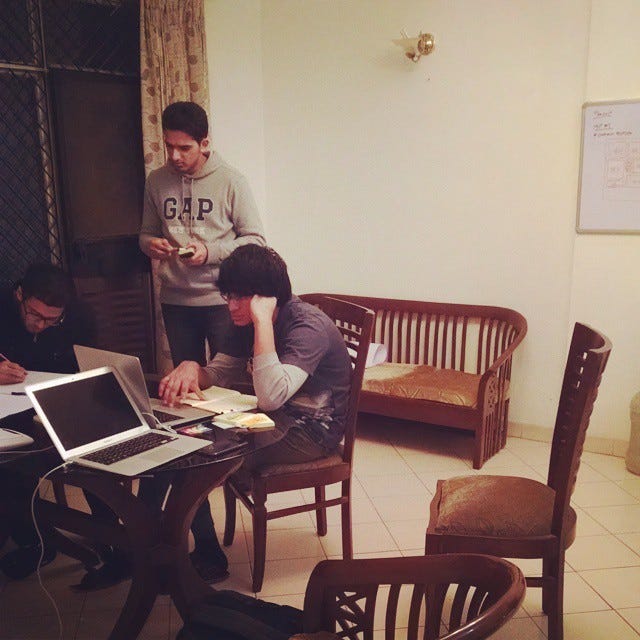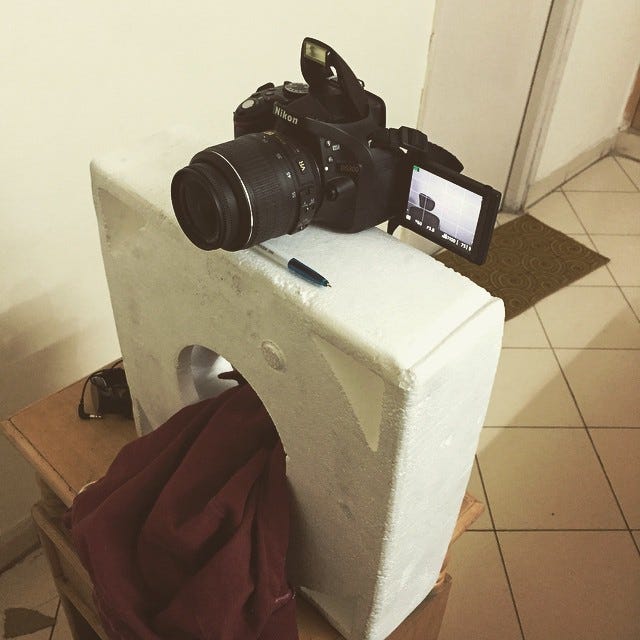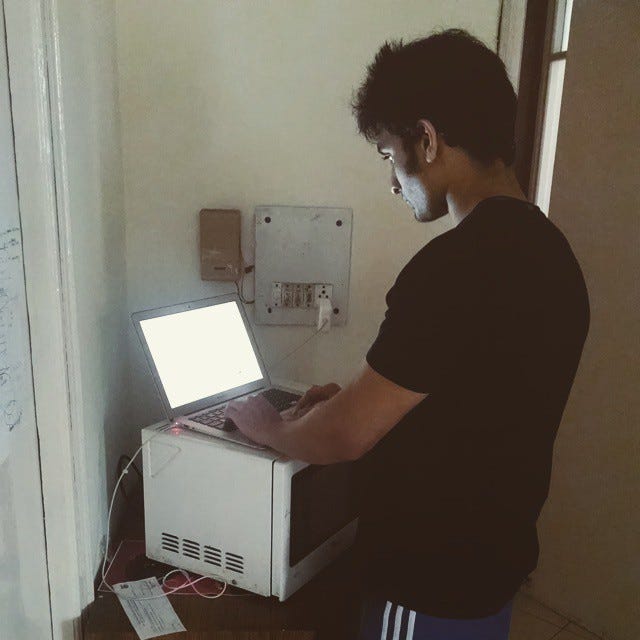4 college students raise a seed funding of $262k for their startup in the 8th semester!
 Part One: Manipal
Part One: Manipal
A year ago, I recollect the incident that started this madness. In the second year of college, we’d started a services company
that made t-shirts, websites and products for people. By the end of the
third year, we were doing over 30 lakhs in revenue and it was getting
incredibly boring. Kartik (our CTO) and me were talking about how we
were clocking in just 3 hours of sleep a night and we needed to slow
down.
“We’re making quite a bit of money for being students,” he said.
“Yeah, let’s do something even more challenging. Let’s do something big.”
“What problem hasn’t been solved yet?” – K.
“Let’s do hiring man. Naukri’s living on borrowed time anyway, let’s dethrone them,” I told him.
“Sounds good.”
And that was it. We shut Sizr down the very next day and began planning what Jobspire would look like a year into the future.
I immediately drafted a north star – a vision document; something I’d show our own employees to inspire them to work here.
Kartik and I had been working
since the first year of college. We were really good product devs, but
that wasn’t enough — we needed to hire some more people. I remember
there was an incredible rush because we were entering the fourth year of
college. Everyone was looking for a “placement” and TCS was hiring
en-masse. I needed to outsell the 100+ other companies appearing on
campus to the people I thought I’d want to work with. I looked through
my contact list and found Sandesh Kini — a quiet little boy who used to
sit on my bench in the back of class. College had broken up for the
mid-semester holidays and he lived back in Bahrain. I asked him if we
could Skype.
“What’s up?” he said, in his usual nonchalant tone.
“Dude. Forget placements and come work with me. I have this startup idea and we think we can revolutionize how work happens across the country. It’s ambitious, but it could work.”
“I’m in,” he said.
“What? Don’t you want to ask your parents or take a while to think?”
“Nope. I’m in.”
This is the fastest I’ve seen
anyone commit to something that at that point was a career defining
risk. We didn’t have the experience we have today, and Sandesh had
absolutely no skills to contribute. Kartik and I used Ruby on Rails and a
bunch of other technologies, while Sandesh was a CS Engineer like us
and had no clue how Ruby worked.
A year ago, most people in this situation would’ve said “I have X number of job offers, why should I choose you?”
but till today I’m impressed by his decision. Sandesh has transformed
into one of the best product developers I know — and we meet product
developers on a daily basis.
“Alright, so who’s going to sell?” I asked the three of us.
“We’ll need someone to sell, but we’re in an engineering college” Sandesh quipped.
I looked through my contact
list and found Mohak Dhingra, another quiet kid who I’d worked with
before at a student organization called AIESEC. He was my neighbor and
we didn’t interact much.
I walked straight to his house and said:
I walked straight to his house and said:
“Dude come work with us. We’re opening a start up.”Being the nice guy that he is, he apologized and shut the door.
“Huh? What’s a startup? I already have a job offer from Mu-Sigma dude. Sorry.”
Being the not so nice guy that I am, I rang the bell again.
“Dude, think about it. It’s a risk but it’ll be fun. A few years later when someone writes a book about this do you want to be the guy who rejected something as awesome as this?”
“I don’t want to put my career on the line. Mu Sigma is a safe bet!”
“Don’t delude yourself. There’s no such thing as safe.”
After almost 2 hours of attempting to convince him, he cracked.
“Okay, speak to my dad,” he said.
“Okay, speak to my dad,” he said.
After a quick Skype session with Mohak’s father, he was sold.
“This is the best time to take a risk.” said his father.
Mohak agreed, but he still wanted to keep his Mu-Sigma offer on hand. I said he could, but under the condition that he doesn’t tell the rest of the team about it.
“This is the best time to take a risk.” said his father.
Mohak agreed, but he still wanted to keep his Mu-Sigma offer on hand. I said he could, but under the condition that he doesn’t tell the rest of the team about it.
To me, it meant our team was
complete. We had everything we needed to be self sufficient and Kartik
and I began working on a prototype for the product. With our old
projects, we were such a good team that one person would choose to do
the design and front-end while the other person would do the backend.
Kartik chose backend, so I positioned myself on the design front. We
needed someone to do testing, so I spent 8 hours everyday for almost a
week teaching Sandesh how to write tests. Truth be told, he learned much
faster than me and put in a degree of effort I once thought impossible.
We slogged away for 3 months.
While Mohak was contacting every HR he could find asking them about
their problems, Sandesh wrote the tests, Kartik and I wrote the code. We
noticed we weren’t sleeping too much. We had to attend college from
8am — 5pm and then we’d work from 7pm — 4am. I didn’t even know when we
slept or ate. It was pure Adrenalin.
After exams, the team got together, this time with a new addition. It
was Rushil, a new developer we’d hired. Sandesh had taken up the
responsibility to train him; Sandesh was now a full-stack developer, all
self learned. It was the best piece of news I’d heard in months.
During this period, we went
to an event in Bangalore where we had met Anshumani Ruddra, head of Tiny
Mogul Games(Hike Messenger’s game studio) and one of our first mentors.
It gave our team a little more exposure. I also made a bold move and
hired Prajwal, a friend of mine from Bangalore to come on as a
co-founder. It was another easy sell.
Part Two: Delhi
The 7th semester of college was over. Everyone had found jobs and we were still building our product.
“I don’t want to do the 8th semester. I think we should just drop out” I proposed. Kartik agreed. Sandesh and Mohak looked at us with disbelief.
“You’re asking us to throw away what we’ve worked 3 and a half years for? You think our parents are going to be okay with that?”
At this point, we decided to
find an incubator or a company to work under. The 8th semester of
college can either be done in college or as an internship under some
other company. Technically, we were doing the most complicated
internship ever, but we’d still need some company to take us under their
wing.
My first instinct was to
apply to Microsoft Accelerator. A few weeks later we got a mail saying
that while we got into the top 10% of all applicants, we neither had the
product or the team to be considered.
We
looked around and found a few good ones. Mohak came to us and told us
that there was this great incubator in Delhi that one of his friends had
worked at. It was called Startup Tunnel.
I applied and had an interview with Startup Tunnel’s director, Aditya Dev Sood, the same day. The interview went fairly well and they sent us an offer letter in the evening.
I applied and had an interview with Startup Tunnel’s director, Aditya Dev Sood, the same day. The interview went fairly well and they sent us an offer letter in the evening.
While Rushil and Mohak were from Delhi and super happy about the decision, Sandesh was neutral and Kartik was visibly upset.
Prajwal couldn’t make it to
Delhi as his college wasn’t letting him leave, so I had to tell him that
he couldn’t be a part of this anymore.
So, off we went to Delhi, where we found a house to live in after much chaos.




The way we worked for
the next 3 months DEFINED shoestring. My back was giving out on be so we
made a makeshift microwave standing desk. We used thermocol that we
borrowed to make a video rig to explain the video resume part of our
product. We really crunched. In March, we had a complete product that
looked and felt awesome. We were stressed and tired (5 boys, 1 shitty
3bhk with no resources) but the product was finally done. We decided not
to do any PR or marketing.
“Let’s just tell people.” I saidMohak brought on our first few companies while the rest of randomly spoke to people on LinkedIn asking them to use Jobspire. It was amazing to see a few people using the platform. We had 70 signups that month. Today we have nearly 70 signups a day — still spending nothing on marketing. Over 100 companies use Jobspire today.
To counter the stress from
working so hard and sleeping so little, we played all sorts of indoor
sports, from pictionary to a weird version of indoor badminton to just
sitting and telling each other our fears and goals in life. We were
becoming family.
As we grew, we met investors.
We couldn’t keep burning the money we had made from Sizr, it was almost
out. The first investor I met ran a famous media company. I had
traveled nearly 4 hours hours to reach his place and I didn’t have a
clue on how valuation economics worked.
The investor agreed to invest
in the company but not in cash. I was upset. We worked so hard. Early
stage investors, atleast the bad ones, look for things like traction.
Good investors on the other hand, look for passionate teams and the
ability to actually shape and mold the future of the country and even
the world.
After Anshumani(our mentor)’s
advice, I read a lot about angel investing, deal metrics in India, etc.
This was not before I embarrassed myself in front of several investors,
including Zishaan, GrowX and a few others. We were preparing for
another pitch event when Nikunj Jain and a few other investors happened
to interview me on Skype. Nikunj absolutely loved the product.
His
confidence helped us through a particularly rough patch we were having.
The minute he said he would put in some cash, the team suddenly stood
up and hit fifth gear again. We haven’t slowed down since that day.
Part Three: Bangalore
At this point, we took a
call to move to Bangalore. Delhi’s weather was horrible and we realised
that we’re still young and needed friends. Nobody in the team had gone
out of the house for 4 months. Isolation can drive you insane and we
realized that.
It was at around this point where we
met Ravi Srivastava from Purvi Capital. Initially, Ravi had committed 3
lakhs and wanted to take on a mentorship role, but we were really
pushing the traction and we saw incredible growth spurts. Ravi was
raising a fund at that point and he asked me if we’d like to be a part
of his portfolio. 
We thought Ravi and Nikunj were
awesome, driven people who thought like us so we said yes. We got a
pretty good (multi-million) dollar valuation at the end of it all.
Towards the end, a lot of investors saw us as a good deal and everybody
wanted to jump in and put in cash. We were very very oversubscribed and
had to make decisions on who to remove from the round! Even today, we
get (on average) 2 investors who want to put in cash on the same terms
as our existing termsheet.
A termsheet for 1.7 Crores
came through and while the paperwork took some time, we finally managed
to raise a round and make sure we have amazing people involved.
We’ve now hired 7 new people, ex-Amazon and Zomato employees, including people much older than us. We even re-hired some of the people who we had to let go (Welcome back, Prajwal). The most impressive fact? We haven’t got our degrees yet!
Businesses can fail at any
time. There are just too many variables, some out of your control and
some in your control. For us, this was never about the business. It was
about family, and sticking together — through sadness, failure and successWe’ve now hired 7 new people, ex-Amazon and Zomato employees, including people much older than us. We even re-hired some of the people who we had to let go (Welcome back, Prajwal). The most impressive fact? We haven’t got our degrees yet!


No comments:
Post a Comment